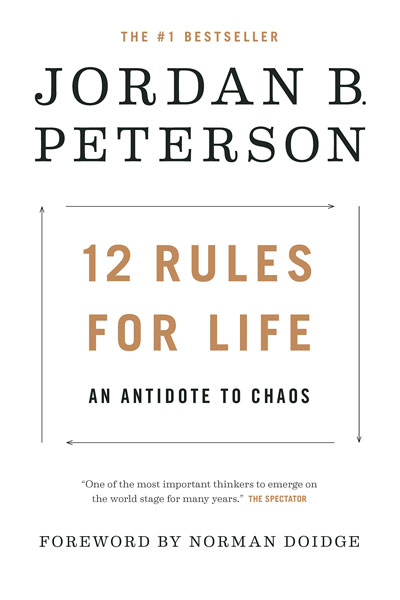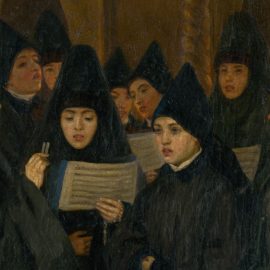

This article is an excerpt from the Shortform summary of "12 Rules for Life" by Jordan Peterson. Shortform has the world's best summaries of books you should be reading.
Like this article? Sign up for a free trial here .
In 12 Rules for Life, Jordan Peterson discusses why our lives feel so meaningless today. Why do we feel so aimless, like our efforts don’t matter, that our lives might ultimately not matter either?
It all has to do with the fall of religion and the rise of secularism. Read more about Jordan Peterson’s meaning philosophy, and how to find it in your own life.
The Historical Rise and Fall of Meaning
Self-sacrifice and delayed gratification have been part of human teachings for a long time, and the discovery of its utility goes back even further. Picture in the Stone Age that a tribe brings down a mammoth, and they engorge themselves until they can’t possibly eat any more. But then they have leftover food. They learn that they can go through the labor of preserving the food today for the benefit of having food tomorrow. Even better, they can give this food to a neighboring tribe and expect a return of favor in the future.
These sacrificial behaviors promoted survival, and they gradually became ritualized and dramatized, customs inherited through generations. They became enshrined in moral narratives and religious texts, like the Temptation of Christ. Wandering through the desert for 40 days and nights, Satan tempts Jesus with hedonism (relieving hunger by creating his own bread), egoism (jumping off a peak and relying on God to save him), and materialism (ruling the kingdoms of Earth). Jesus rejects all these temptations of evil and immediate gratification. Instead he reaches for a higher goal, of transcending desires to do good.
(Shortform note: In one interpretation, these temptations are different paths for Jesus to become a Messiah by demonstrating supernatural powers. He can easily alleviate physical hardships; he can relieve Roman oppression by seizing the kingdoms. Jesus rejects these options – he wants to undergo his trials without powers that ordinary humans don’t have, in effect becoming a practical role model for humans. Instead of making bread for everyone, he sets an example of a practice that can forever solve the problem of hunger for everyone – rejection of immediate gratification and the temptations of evil.)
Despite its tremendous influence, Christianity had a few problems that limited its reach in the modern day:
- It failed to sufficiently address the problem of suffering in the present day (“why would God allow this atrocity to happen?”), which helped give rise to science and alchemy.
- People felt Jesus had already died to relieve all of mankind’s sins, thus freeing people from personal moral obligation.
- Protestant belief switched from salvation by works to salvation by faith.
- In Catholic belief (and that of other denominations), both faith and works are necessary for salvation. However, this raised an issue of how to assess “worthiness,” and allowed kings to see themselves as morally superior to their subjects.
- The Protestant switch was meant partially as an expression of equality between all people – salvation comes from faith alone. However, this move devalued effort in this life, since one couldn’t earn salvation anyway.
Nietzsche argues that humans killed God, and they would have to invent their own values in the aftermath. However, ideologies like fascism and communism filled the void instead.
Most humans crave order and meaning in existence, to deal with the terrifying uncertainty of the world. For much of history religion served this function (eg being a servant of God). But as secularism rises, a void remains that is filled by nihilism and empty ideologies.
What Is Jordan Peterson’s Meaning?
OK, so we lack meaning today. But how do we find it? How do we define what’s good and worth doing, and what isn’t?
In 12 Rules for Life, Peterson tackles meaning this way: it seems intuitively true that certain things can be defined as Evil – most abhorrently, conscious human malevolence. Auschwitz, mass shootings, enslavement, knowing torment of others – these are all things most people believe are bad, even without having to read a philosophy book. You likely believe the world is better off without these things happening.
If there is such a thing as Evil, then Good must be the antithesis of Evil – Good is whatever stops Evil from happening. Good alleviates unnecessary pain and suffering.
In the most extreme of cases, literally fighting evil is good – as typified in the Union’s antislavery stance in the Civil War, and the Allies’ anti-Holocaust stance in World War II. But all actions exist on a spectrum, and resolving even little bits of bad are good. This could mean counseling a friend to get out of a bad situation. This could mean improving your own health, so that you have more ability and time to do good. This could mean empowering others to do good – even by helping people understand what good and evil is, like Peterson is doing.
Doing good has Meaning, Jordan Peterson says. When you act with Meaning, you will attain more security and strength than would be granted by a short-sighted concern for your own security. What you do will matter to you. In turn you’ll feel better about your existence, and the evils and injustices of the world are more tolerable, because you know they can be overcome. Remember Socrates who, believing his principles to be right, retained the strength to speak true at his trial and accepted his death with resolve.
———End of Preview———

Like what you just read? Read the rest of the world's best summary of "12 Rules for Life" at Shortform . Learn the book's critical concepts in 20 minutes or less .
Here's what you'll find in our full 12 Rules for Life summary :
- Why standing up straight will make people treat you differently
- How to find meaning in your life and work
- Why you're lying to yourself without realizing it






